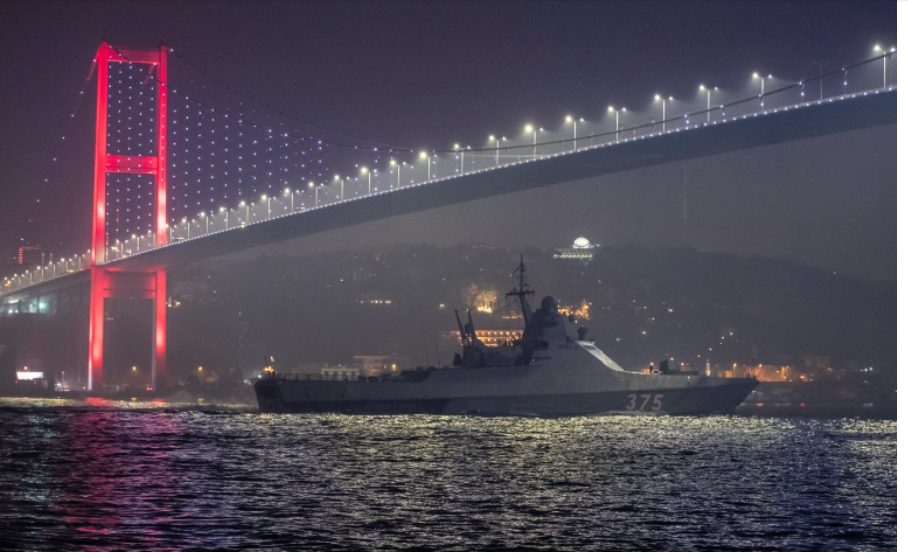Turkey previously enjoyed warm ties with both Russia and Ukraine, and shares a maritime border with both in the Black Sea. Despite attempts to preserve strict neutrality in the war, Turkey finds herself being sucked into the war. Diplomatic and economic consequences are only now beginning to shape. The shock to Turkey will depend on the duration of the conflict, whether NATO gets involved and how long the war will keep energy and agricultural commodity prices high.
Ukraine’s ambassador to Turkey had earlier urged the country to shut the straits to Russian warships.
Up until now, Turkey had avoided referring to Russia’s invasion of Ukraine as a war, merely saying that Russia’s actions violated Ukraine’s “political unity and integrity” and were “unacceptable.” Turkish Press reports Foreign Affairs Minister Cavusoglu stating that all the clauses of the Montreux Treaty will be employed, which may mean closing the Straits to Russian War ships. It is an ambiguous statement, which could also be used to bar NATO warships from the sea of conflict.
The rhetorical shift was echoed by Turkish spokesperson Fahrettin Altun, who repeatedly referred to the conflict as a war in a series of tweets Sunday.
Reuters claimed “Turkey to implement pact limiting Russian warships to Black Sea”. “It is not a couple of air strikes now, the situation in Ukraine is officially a war… We will implement the Montreux Convention,” Mevlut Cavusoglu, Turkey’s foreign minister, said in an interview with broadcaster CNN Turk.
Yet Cavusoglu reiterated that Turkey cannot block all Russian warships accessing the Black Sea due to a clause in the pact exempting those returning to their registered base.
“There should not be any abuse of this exemption. Ships that declare returning to their bases and passing through the straits should not be involved in the war,” Cavusoglu said.
It is not clear how Turkey would verify such a condition of passage. Turkish maritime experts claim Kremlin had already ordered or mission-critical warcraft to Black Sea, thus the measure would at best have a symbolic impact.
Bianet: Russia-Ukraine war: How will it affect Turkey’s economy?
Turkey is becoming one of the countries which will be affected by the war the most. Policies to be followed by Turkey vis-a-vis combatants will affect numerous industries from tourism to trade, industry to agriculture.
According to the Turkish Statistical Institute (TurkStat), Turkey’s annual foreign trade volume with Russia is 34.7 billion US dollars (USD). Its annual trade volume with Ukraine stands at 7.4 billion USD. Taken together, the total trade volume of the two countries is 42.1 billion USD.
Russia is one of the leading import and export partners of Turkey.
While citrus fruits, fresh grapes and tomatoes, so fresh fruits and vegetables, machines, land vehicles and their equipment, garments and their accessories are the major export goods from Turkey to Russia, Turkey mostly imports oil, natural gas, hard coal, iron-steel products, unprocessed aluminum and various agricultural products from the country.
The most profound effect may be on agriculture
Turkey is the largest importer of agricultural products from Russia. Turkey’s total import of agricultural products from Russia stood at 4.3 billion USD. As for the agricultural product imported from Russia the most, it is wheat. In 2021, Turkey imported 6.7 million tons of wheat for 1.8 billion USD. However, Russia is not the only country. Ukraine ranks second.
According to the data of the Trade Ministry, 64.6 percent of Turkey’s wheat import is from Russia while 13.4 percent is from Ukraine.
Civil Unrest Mushrooms Across Turkey
So, if the war between the two countries has a negative effect on imports, food prices, especially that of bread, will be affected negatively.
Moreover, Turkey also ranks first in imports of sunflower oil from Russia and Ukraine. The country imports 65.5 percent of sunflowers from Russia while it imports 4.2 percent from Ukraine.
Turkey dependent on Russia for energy
Turkey imports most of its energy from Russia. Data show that Turkey consumed 48.1 billion cubic meters of natural gas in 2021. 33.6 percent of this gas was coming from Russia.
Turkey has two deals with Russia regarding natural gas from the years 1997 and 1998. One of the deals will remain in effect until 2025. However, the other one expired by the end of 2021, so, last year.
Though Turkey’s Energy and Natural Resources Minister Fatih Dönmez announced in November that they agreed with Russia on a new deal in principle, no official statement was made about an agreement.
Turkey’s Energy Shortage Reaches Critical Point
During the crisis that broke out after Turkey shot down a plane of Russia in 2015, the country did not cut natural gas flow to Turkey but it is not certain how things will turn out during the invasion of Ukraine.
To make matters worse, the current crisis has been further increasing natural gas prices, which were already very high.
Besides, the conflict affects oil prices, too. A barrel of oil now costs more than 100 USD, which marks the highest figure since 2014. Given that Turkey is completely foreign dependent for oil, it will get the same oil by paying more, which will lead to an increase in its current deficit.
A season without tourists?
Nearly 30 million tourists visited Turkey last year, which meant 24.5 billion USD revenue.
The total number of tourists coming from Russia and Ukraine accounts for 23 percent of total, but only 18 percent of revenue.
Turkey was expecting 35 million tourists and a total revenue of 35 billion USD in 2022. The invasion, war economy and sanctions will surely have an effect on the number of tourists to come to Turkey as well.
Hotels, shop owners in tourist destinations and employees are the ones who will be effected by the ensuing crisis the most.
Follow our English language YouTube videos @ REAL TURKEY:
https://www.youtube.com/channel/UCKpFJB4GFiNkhmpVZQ_d9Rg
And content at Twitter: @AtillaEng
